
























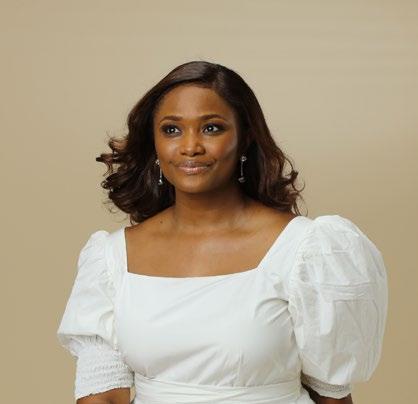
OnahNwachukwu Editor, THEWILL DOWNTOWN




Shaffy Bello isn’t your regular Nollywood actor; she is also a singer who became famous in the entertainment industry for her vocals in Seyi Sodimu’s 1997 hit song, Love Me Jeje. She moved back from the US, debuted in the movie Eti Keta, and has acted in numerous English and Yoruba films since then. Bello believes that whatever you are set upon this earth to do comes to you, and if you are aware of it, you recognise it and latch onto it. So, what she did over the years was to be sensitive to the things around her.
Unlike other Nollywood actors, Bello would rather not be called an actor. Instead, she prefers being called a becomer because once the camera goes on and you hear “action,” you should become the character. When she’s not on set, she wakes up any time she pleases; Shaffy Bello describes that as a blessing.
Read her interview on pages 8 to 10.
Leggings can be worn in various ways. Although many people think you can only wear them to the gym or while lounging, this fashion piece can be worn to different events as well; the secret is in the styling. We show you six simple yet stylish ways to look put together when wearing leggings. Scroll to pages 4 and 5.
Our beauty page discusses locs. While locs can be distinctive and adaptable, they require some work and attention to keep looking clean, fresh, and healthy. On page 12, we highlight six easy-to-follow methods for keeping the best-looking locs.
On October 1st, we celebrated our Independence Day. Happy 64th Independence to Nigeria. To commemorate this, our movie review page features five Nigerian movies you must watch. It’s quite a good selection.
Until next week, enjoy your read.
OnahNwachukwu


@onahluciaa +2349088352246





SUNDAY, OCTOBER 6, 2024 THEWILL NEWSPAPER • www.thewillnews.com





SUNDAY, OCTOBER 6, 2024




BY AMOS ESELE
The initial applause that greeted the April 11,2024 Supreme Court judgement on local government financial autonomy, as a means to usher democratic governance at the grassroots, has suffered a setback as affected states conduct local government polls.
With the October deadline set by the Federal Government and the Governors Forum for conducting democratically elected local government elections in mind, 20 states that have been systematically violating Section 7 (1) of the Constitution, which declares: “The system of local government by democratically elected local government councils is under this Constitution; and accordingly, the Government of every State shall, subject to section 8 of this Constitution, ensure their existence under a Law which provides for the establishment, structure, composition, finance and functions of such councils…” have started to put the machinery in place to fulfil the apex court ruling. They are Anambra, Bauchi, Benue, Plateau, Abia, Enugu, Imo, Katsina, Kano, Sokoto, Yobe, Ondo, Osun, Delta, Akwa-Ibom, and Cross River. Others are Rivers, Sokoto, Zamfara and Kwara.
As of the time of going to press, Bauchi, Borno, Delta, Enugu, Gombe, Kebbi, Kwara, Imo, Anambra, Sokoto, have already conducted elections, which opposition parties have described as mere rigging of candidates of the ruling party into office. Eight others have fixed polls for October: Benue, Akwa Ibom, Jigawa & Rivers (October 5), Plateau (October 9), Kaduna (October 19), Kano (October 26), and Cross River (October 26).
Eight states have extended their poll date, either for legal reasons whereby the tenure of elected LGA officials is yet to expire or for mere convenience. For example, Nasarawa State has fixed Nov 2 for the conduct of its poll because the tenure of its 13 LGA and 147 councillors ends on October 7, 2024.
Similarly, Katsina State, which has extended the tenure of its elected Council officials by six months, has fixed its election for February 15, 2025. Ogun, where the tenure of elected council officials ended in July, 2024, has set November 16, 2024 for the LGA polls.
Abia, where appointed Chairmen popularly known as Mayors, had been in office, will hold council polls on November 2. Understandably, Ondo, where a governorship poll comes up on November 16, has shifted the conduct of the LGA poll to January 18, 2025. Osun has fixed its poll for February 2, 2025.
ISSUES AT PLAY
In their rush to conduct LGA polls and meet the timeline as conditions for assessing the statutory federal allocations for their councils, many states are violating legal and constitutional provisions that may make the Supreme Court ruling a legal anti-climax.
Following the Supreme Court judgement on July 11, 2024, which granted financial autonomy to local government councils, the Federal Government and state governors agreed to a three-month timeline within which elections must be democratically held in the local government areas. Or else, the
states risk losing the monthly allocations to LG based on the apex court inspired, “no elected LGA officials, no allocation.”
The National Chairman of the Inter Party Advisory Council of Nigeria, IPAC, Alhaji Yusuf Dantalle thinks the LGA polls conducted so far in many states are a mockery of democracy, however they may be seen as a welcome development.
“The most outrageous part of it all is nomination fees imposed by state electoral commissions. This is neither part of the electoral requirement, nor is it in the Electoral Act,” he told THEWILL in a brief interview on Friday, querying, “How can you impose a fee of N10 million for the position of Chairman and N5 million for Deputy and N2 million on Councillorship position if the intention in not to shut the door against rivals?”
“There should be some minimum standard allowed when it comes to the conduct of elections and announcement of results. But no, the State Electoral Commissions, SIECs, so far have been perpetuating fraud in the release of results. Take for example what happened in Imo State where only names were announced or in Anambra where the government is using the House of Assembly to perpetuate electoral fraud.”
In the declared results of elections held in the states across the country so far, the governing party won all Chairmanship, Deputy Chairmanship and Councillorship seats, leaving other parties with nothing. Some opposition parties have already filed cases in court to challenge the election.
Professor Okey Ibeanu of the University of Nigeria, Nsukka, told
this newspaper in an earlier interview that though the apex court ruling is a “star judgement” that is good for democracy, its value will be “completely lost if State Independent Electoral Commissions, SIECs, are not also "rescued" from state governors. SIECs are now their only remaining route to perpetuating the illegalities that the Supreme Court dealt with in its judgement.”
Responding to the illegality allegedly perpetuated in Anambra State as referenced by Alhaji Dantalle and amplified by federal lawmakers, namely, Senator Tony Nwoye, George Ozodinobi, Reps Afam Ogene, Idu Emeka, and Anekwe Peter, last Thursday, to the effect that Governor Charles Soludo’s Local Government Administration Law 2024 contains provisions in Section 13 that provides for State Joint Local Government Account, quite contrary to the apex court judgement, the Commissioner for Information, Dr Law Mefor, said both the lawmakers and the IPAC National Chairman, are mistaken.
He told THEWILL on Friday that though he also knew about the lawmakers grouse from news reports and is yet to see or read the law referred to by them, he thinks the local government poll that took place on September 29, 2024 was conducted in accordance with the law.
Mefor said, “The Anambra LGA poll was conducted under a law. A law that set election timetables. Even the ANSIEC gave 48 days’ notice more than the required 30 days as stipulated by law. It is incorrect to say Anambra conducted an election because of the Supreme Court judgement. Governor Charles Soludo promised during his campaign for the governorship position in the state that he would conduct LG council elections. That he has done. Former Governor Peter Obi conducted an election when he was about to leave office, which means he did not rule Anambra with elected councils, His successor, Willie Obiano did not conduct any. Governor Soludo has stayed just two years in office, and he has fulfilled his campaign promise. So, everything was done under the law in a transparent and fair manner, passing all integrity tests. Anybody who believes it was done outside any law can go to court.”
ANOTHER ASPECT IN RIVERS STATE
While the foregoing states that have conducted their LG polls have done so peacefully, though in perceived controversial circumstances, the LGA poll that held in Rivers State on October 5, 2025, unlike similar ones holding on the same day in Benue and Akwa Ibom States, have the undertone of political volatility attached to it.
The law, naked display of power and potential violence were already at play ahead of the poll. The warring parties are divided on the conduct of the election. Governor Siminalayi Fubara who vowed that the poll would hold as planned, rested his case on a court ruling, while the opposition flaunted a Federal Court ruling they claimed is fresh, that has stopped the poll.
that the election should not be held? It said don’t give voters register. What are we doing with it? Okay, police don’t provide security. Is it the same thing as blocking the election? Fubara said.
“Did Lifu, the Justice that gave that fraudulent judgment, say no election? Rather he tactically said don’t provide security. We don’t need your security. We will provide our own security. After all, it happened during the Anambra election,” he added.
The governor vowed that the election would be held, and the winners will be “sworn in.”
The opposition was led by former President of the Nigerian Bar Association, Onueze C. Okocha, a Senior Advocate of Nigeria, SAN, and Minority Leader in the House of Representatives, Hon. Kingsley Chinda. According to Okocha, the September 30, Federal High Court ruling is the final judgement which preceded the State High Court judgement that okayed the election.
“The final court judgement called on all parties concerned, the INEC, State SIEC, Attorney-General of the State, InspectorGeneral of Police, the Department of State Security, DSS. Justice Lifu’s judgement is the latest that all parties ought to be bound with. The seventh prayer restrained INEC from releasing the voters register and police from providing security for the election of October 5. So, who is saying the court did not stop the election?”
Another Senior Advocate of Nigeria, SAN, Jibrin Okutepa on Friday disagreed with Okocha. He faulted the Federal High Court ruling on the grounds of what he referred to as judicial independence free from interference by politicians. Taking to his X account Okutepa, said, “Section 1 of the 1999 Constitution makes the Constitution supreme and binding on all persons, including Nigeria Courts.
“Section 287 (1) further stipulates that decisions of the Supreme Court, whether rightly or wrongly decided, cannot be questioned or ignored by any court or individuals in Nigeria: they can only be criticised.”
He wondered why some judges continue to issue orders restraining INEC from releasing electoral materials to SIEC, thereby obstructing local government elections despite the Supreme Court ruling.
However, the Police Command in the state, in its reaction, said its personnel would not provide security for the election in the state. The spokesperson of the Command, SP Grace IringeKoko, said the action follows a Federal High Court judgment
“delivered on September 30, 2024, which prohibits the Nigeria Police Force from participating in or providing security for the election.
According to Iringe-Koko, the Rivers State Police Command was advised by the Legal Department of the Nigeria Police Force to comply with the court order.
Indeed, the two major political parties, the PDP and APC have divided the state and they continue to issue conflicting statements for and against the poll. The PDP faction that is loyal to Wike, led by Dr Eron Chukwuemeka, said the party would not participate and urged supporters to shun the poll. But another factional leader of the party loyal to Governor Fubara, Dr Robinson Ekwor, called on members to contest and vote. The same was true of the APC. The faction led by Tony Okocha said the party would not participate, while the faction led by Emeka Beke, who is loyal to former Transportation Minister, Rotimi Amaechi, supports the election.
Surprisingly, the National Working Committee of the PDP on Friday night threw its weight behind Governor Fubara and directed its members to participate in the poll. The National Publicity Secretary of the party, Debo Ologunagba, said, among others, “For the avoidance of doubt, Section 84 (15) of the Electoral Act, 2022, provides that “Nothing in this section shall empower the courts to stop the holding of primaries or general elections under the Act, pending determination of the suit.”
RSIEC Chairman, Justice Adolphus Enebeli, retd. cited a ruling by the State High Court mandating the commission to continue the election, adding that 18 out of 19 political parties would participate in the poll.
Beneath all these talk about constitutionality, legality and protest for and against the conduct of the poll, was the political aspect which is about who between Fubara and Wike, controls the political structure in the state, particularly at the grassroots, ahead of the 2027 general election, the chief source of struggle between them since October last year.
For Fubara, all “his men”, meaning the caretaker committee chairpersons, moved into the Action Peoples Party, APP, to contest council polls. A dependable government source confirmed the development anonymously to THEWILL but absolved the governor of any involvement in the defection.
He said, “You are a journalist. So, you can do your reporting. But the truth is that the PDP had names for the planned congresses that were submitted to the NWC. They accepted the list and kept it, saying the NWC cannot approve it without approval of the National Executive Committee, NEC. Up till date, there is no confirmation of that list because they said they are respecting a court judgement that stopped them from conducting a congress. So, ask me which party executive will give an order for party members to defect to another party.?”

Lawyers, political parties, lawmakers, elders and youths were on both sides of the divide, leaving the state even more polarised since the supremacy battle between the governor and his predecessor and FCT Minister, Nyesom Wike started in October 2023.
THE CAUSE OF TROUBLE
The Federal High Court, Abuja on Monday, September 30, restrained the Independent National Electoral Commission (INEC) from releasing the voters’ register to the Rivers State Independent Electoral Commission (RSIEC) to conduct the October 5, 2024, local government election in the state.
Justice Peter Lifu also barred the Inspector-General of Police (IGP) and the Department of the State Services (DSS) from providing security for the poll.
Earlier, a Rivers State High Court had ordered security agencies, including the Nigeria Police Force (NPF), to provide adequate security and ensure the maintenance of peace, law and order during and after the election.
The court also ordered RSIEC to conduct the election, using the National Register of Voters for the 2023 General Election compiled by the Independent National Electoral Commission, INEC.
According to Fubara and his party, the Abuja Federal High Court judgement did not stop the poll from being held.
“Everybody is aware of the court judgment and even the judgment as they call it. Did the ruling specify anywhere
Section 1 of the 1999 Constitution makes the Constitution supreme and binding on all persons, including Nigeria Courts. Section 287 (1) further stipulates that decisions of the Supreme Court, whether rightly or wrongly decided, cannot be questioned or ignored by any court or individuals in Nigeria: they can only be criticised

Investigation, however, showed that the defectors would likely retrace their steps to the PDP after “their victory at the poll successfully conducted by RSIEC.”
Apart from his advocacy for the rule of law in the conduct of polls, Dantalle said SIEC should be scrapped.
“SIEC is evil, it must be scrapped if we must have democracy at the grassroots, where the most important tier of government closer to the people operates. They are there to do the bidding of state governors.
“Our judiciary must stop giving contradictory judgements on election matters. In the ongoing case in Rivers State, for instance, the courts are giving contradictory rulings when they know they do not have the power to stop an election from being held; It is a constitutional matter.”
According to Prof Obienu, to release SIEC from control of governors, “funding of SIECs must be charged to the Federation Account and released directly to them. The public must be involved in screening nominees by providing character references and the power of SIECs to hire and fire staff must be guaranteed.”
Okutepa, SAN, said that Judges should remain impartial and free from political influence, making decisions solely based on facts and legal arguments. In any nation where the rule of law prevails, he contested, judges must be independent. They should not be seen to be partisan or tools for politicians.



BY AMOS OKIOMA
Former President Goodluck Jonathan has called for peace in the political situation in River State to avoid a breakdown of law and order.
Arguing that the current political crisis in Rivers State compares to the crisis of the old Western region, the former president called on the security agencies and judiciary to aim for peaceful resolution of the situation, while he appealed to political actors to put aside their interests and unite against what could lead to a breakdown of law and order.
In a statement he issued on Saturday, Jonathan said, “I am aware that the local government election taking place in Rivers State today, October 5, has been a subject of great interest to political actors.
“The political happenings in Rivers State in the past days is a cause for serious concern for everyone, especially lovers of democracy and all actors within the peace and security sector of our nation.” He described political election processes as the cornerstone of democracy because they give the people an opportunity to choose their leaders.
He stated, “Elections are the cornerstone of democracy because they are the primary source of legitimacy. This process renews the faith of citizens in their country as it affords them the opportunity to have a say in who governs them. Every election is significant, whether at national or sub-national levels as it counts as a gain and honour to democracy. It is the responsibility of all stakeholders, especially state institutions, to work towards the promotion of a sound democratic culture of which periodic election stands as a noble virtue.
“Democracy is our collective asset, its growth and progress are dependent on government commitment to uphold the rule of law and pursue the interest of peace and justice at all times. Institutions of the state, especially security agencies must refrain from actions that could lead to breakdown of law and order.”
Rivers State represents the gateway to the Niger Delta and threat to peace in the state could have huge security implications in the region. Let me sound a note of caution to all political actors in this crisis to be circumspect and patriotic in the pursuit of their political ambition and relevance.”
Furthermore, he called on the National Judicial Commission to take action to forestall a proliferation of court orders.
“The political situation in Rivers State, mirrors our past, the crisis of the Old Western Region. I, therefore, warn that Rivers should not be used as crystals that will form the block that will collapse our democracy.
BY LADI DAPSON, MAIDUGURI
The Borno State Government has announced a cholera outbreak following the confirmation of 17 cases by the National Reference Laboratory in Abuja.
At a media briefing in Maiduguri, the State Commissioner for Health and Human Services, Professor Baba Malam Gana, reported that out of 451 suspected cases, 148 samples were tested, with 17 returning positive results.
Gana, who confirmed that there have been no reported fatalities associated with the outbreak, named Maiduguri Metropolitan, Jere, Konduga, Mafa, and Monguno as the affected local government areas.
The Commissioner attributed the outbreak to the recent flood disaster which has contaminated water sources and sanitation facilities in the metropolis.
“While Borno State Ministry of Health in collaboration with NCDC, WHO, UNICEF, MSF, ALIMA, IRC and other Partners recorded 451 cases, tested 148 samples, results show 20 RDT negative, 128 RDT positive, with 17 culture Positive for Vibrio Cholerae, and zero mortality (CFR:0 %). The LGAs mostly affected are MMC, Jere, Konduga, Mafa and Monguno.
“At this stage, I wish to categorically inform the good people of Borno state and the media that we are having a cholera outbreak in the state which is highly contagious and can be transmitted via fecal-oral route with an approximate incubation period of 2-5 days,” Gana stated.
The Commissioner of Health also confirmed that the state has received 300,000 doses of cholera vaccines from the Federal Ministry of Health and has so far vaccinated over 287,000 people mostly women and children in IDP camps.
He said the state is awaiting additional 600,000 doses which will greatly help in minimising cases of cholera in the state.
“We know that with the floods that we had in Maiduguri, cholera is one of the waterborne diseases that we were expecting, and we were prepared, we started the vaccination, and that is the degree of level of preparation.
“We’ve also had all our staff well educated about cholera, and we set up three to four places within Maiduguri, where cholera cases can be attended to,” he said.
Gana called on the people of the state to imbibe the culture of personal and environmental hygiene to curb the spread of the disease.
BY FELIX IFIJEH
Vice President Kashim Shettima has directed the implementation of a sweeping overhaul of Nigeria's road safety measures.
The directive is aimed at addressing Nigeria's road safety challenges and drastically reducing road traffic accidents across the nation.
A statement by Stanley Nkwocha, Senior Special Assistant to the Vice President on Media and Communications, said Shettima gave the directive on Friday, during a meeting with the leadership of the Federal Road Safety Corps (FRSC), led by its Corps Marshal, Shehu Mohammed, at the Presidential Villa, Abuja.
Accordingly, the Vice President is set to inaugurate the National Road Safety Advisory Council saddled with the responsibility of reducing traffic accidents by half before 2030.
Speaking during the meeting with the FRSC leadership, the VP stressed the urgent need to address the increasing road accidents on the highways and in the cities caused by nonadherence to traffic regulations.
"We need a comprehensive solution for our road safety challenges. The whole ecosystem is not as it should be", VP Shettima stated, emphasising the need for "deliberate efforts toward addressing our road challenges", in line with international best practices in countries like Dubai and the UK.
The Vice President, who chairs the National Road Safety Advisory Council, highlighted the importance of leveraging technology and enforcing discipline to improve road safety.
"In places like Dubai and the UK, they have a mechanism of checking road traffic violators, capture their car number plates and are charged directly from their bank account. This way, people are encouraged to obey the law. We need to be a disciplined nation", Shettima remarked.
The Vice President emphasised the interconnected nature of road safety with broader security concerns, saying "The FRSC's job is intertwined with that of the Nigerian Police as it is part of the security architecture of the nation."
Drawing parallels to successful security initiatives he had observed in Enugu state, he said "I was in Enugu yesterday and the state government is doing so well. The governor has put in place a security architecture where the whole town and the whole state are under surveillance including the forest areas."
L-R: Minister of State for Health and Social Welfare, Dr. Tunji Alausa; Governor of Lagos State, Mr. Babajide Sanwo-Olu; the State Attorney General/Commissioner for Justice, Mr. Lawal Pedro, SAN and House of Reps. member, Epe Constituency, Hon. Wale Raji, during the Lagos Trauma Conference and signing of MoU for transfer of the Epe General Hospital to the Federal Government, held at Landmark Event Centre, Oniru, Victoria Island in Lagos on October 3, 2024.

Justice W.I. Aziegbemhin of Edo State High Court sitting in Benin City, has convicted and sentenced one Ofure Prince Akpolo to three years imprisonment for retention of proceeds of crime.
The convict was prosecuted by the Benin Zonal Directorate of the Commission on September 24, 2024 on one-count charge bordering on retention of proceeds of crime.
The charge against Akpolo reads: That you Ofure Prince Akpolo (m) on or about the the 3rd day of June. 2024 in Benin City, Edo State within the jurisdiction of this Honourable Court did without lawful authority take possession of the sum of $22, 297.97 (Twenty-Two Thousand, Two Hundred and Ninety-Seven United States of America Dollars, Seven cent) in your domiciliary account number: 5436344024 domiciled in First City Monument Bank knowing that the money represent proceeds of your criminal conduct to wit: Cybercrime and thereby committed an offence contrary to Section 18 (1) (a) of the Economic and Financial Crimes Commission (Establishment) Act 2004 and punishable under section 18 (2) of the same Act..
The defendant pleaded guilty to the charge when it was read to him in court, prompting the prosecution counsel, F.A Jirbo, to pray for the court to convict and sentence him accordingly. However, counsel to the defendant pleaded with the court to temper justice with mercy, claiming that his client has become remorseful for his actions. After listening to the submission of the counsel, Justice W.I Aziegbemhin convicted and sentenced Akpolo to three years imprisonment with an option of N500,000 fine.
The court ordered the convict to forfeit his phone, balances in his various bank accounts, being instruments and proceeds of crime to the Federal Government of Nigeria. He is to undertake in writing to be of good behaviour afterwards
The convict’s journey to the Correctional Centre began following his arrest by operatives of the Benin Zonal Directorate of the Commission regarding his fraudulent activities. He was thereafter prosecuted and convicted.

BY KAJO MARTINS, MAKURDI
The Benue State Chapter of the Peoples Democratic Party (PDP) has elected a new Working Committee to run its affairs with Mr Ezekiel Adaji, emerging as the Chairman. Announcing the results after the state congresses held in Makurdi on Thursday, the Chief Returning Officer for the election, Shaba Ibrahim, said the exercise was conducted in line with the PDP constitution.
He commended all the delegates for their orderiness, expressing the hope that members of the committee would work in synergy to move the party forward. Reacting to the development, Chief David Amoh said the state congress of the party was long-awaited, saying the people of Benue North East are fully mobilized to throw their support for the unity and progress of the party. On his part, the Chairman of G-14, Dr Laha Dzever, expressed the hope that the PDP will reclaim power in Benue State in 2027, while Mr Matthew Ileh of Benue South noted that Zone C is completely PDP and will sustain the status there. The State Acting Caretaker Chairman of the PDP called for support for the party to regain its strength in the state ahead of the 2027 general election.
Earlier, the CPC Chairman, Barr. Ejembi commended former governors Gabriel Suswam and Samuel Ortom, as well as Senator Abba Moro and the national secretariat of the PDP for creating an enabling environment for the caretaker committee to operate Responding on behalf of other officials, the State Chairman, Hon. Ezekiel Adaji, said with unity of purpose, the party will wrestle power from the APC in Benue State at the next election.
He promised to set up a reconciliation committee to look into issues that may have arisen during the conduct of ward and local government congresses with the aim of resolving them amicably. He promised to run an inclusive regime for the good of all and the party and thanked all who made the election a reality. Other members of the committee are Hon. Azua Avough Ashongo, State Deputy Chairman; Daniel Nyikwagh, State Secretary; Tivzua Zuana, State Treasurer; Tim Nyor, State Publicity Secretary; Ibya Atondu Terkimbi, Youth Leader; Abraham Waroh, Vice Chairman Zone A; Tyona Gabriel Gbenyi, Vice Chairman Zone B; Uche Augustine Ikeke, Vice Chairman Zone C; Aba Caleb Mgiringa, Organising Secretary; Emmanuel Adokwu, Financial Secretary, and Albert Ene Alice, Women Leader.
The elections also produced Mrs Akua Ngueren Vera as Auditor; Agbakor Emmanuel, Legal Adviser; Clement Ogbu, Assistant Publicity Secretary; Eche Emmanuel Jacob, Assistant State Auditor; Akpentomun Isaac Nav, Assistant Legal Adviser; Dennis Ayange, Assistant Secretary Zone A; Robert Mkar Hembe, Assistant Secretary Zone B; Francis Inalegwu Ogbanje, Assistant Secretary Zone C; Ande Viashima, Assistant Youth Leader Zone A; Terver Jirgba, Assistant Youth Leader Zone B; Una Kingsley Gabriel, Assistant Youth Leader Zone C; Mrs. Fatmon Nav, Assistant Women Leader Zone A; Dorcas Zamber Mlumun, Assistant Women Leader Zone B, and Regina Lawani, Assistant Women Leader Zone C.
SEGUN AYINDE, ABEOKUTA
Ogun State Government has donated N200 million to the Borno State Government following the devastating flood that recently ravaged the state, destroying property and displacing thousands of residents.
Recall that Governor Dapo Abiodun had earlier sent messages of condolence to the people and Borno State government, commending the state government for its prompt response alongside interventions from the federal government.
Announcing the donation on Saturday, the Special Adviser to the Governor on Media and Strategy, Hon. Kayode Akinmade stated that the gesture was aimed at assisting the victims of the flood and providing immediate relief.
He noted that the flood had caused an unimaginable humanitarian crisis in the state, necessitating immediate support from all Nigerians to provide succour for the affected people.
The National Emergency Management Agency reported that the flood began after the Alau Dam overflowed due to heavy rainfall, leading to the worst flooding the town had experienced in 30 years.
According to reports, at least 414,000 people have been displaced, and 30 lives lost in the devastating flood in Maiduguri, the Borno State capital.

BY UKANDI ODEY
In a bid to justify its claim that the September 21, 2024 governorship poll in Edo State was rigged against the party, the Peoples Democratic Party, PDP, has begun to explore all legitimate means to “reclaim its stolen mandate.”
Apart from the legal route, through which the party’s candidate in the election, Asue Ighodalo, confidently said his mandate would be restored, the party has also resolved to register its displeasure with the outcome by hitting the streets in protest .
The Independent National Electoral Commission, INEC, had declared Monday Okpebholo, the candidate of the All Progressives Congress, winner of the election after he secured 291,667 votes.
Asue Ighodalo of the Peoples Democratic Party, received 247,274 votes and the Labour Party candidate, Akpata who polled 22,763 votes
The PDP and its candidate have rejected the results. Ighodalo, who has vowed to challenge the results at the Election Petitions Tribunal, alleged that the electoral process was massively violated during the election. He said, “All the forms EC8A in the possession of the PDP, when totaled, showed clearly that we won the election.”
He said there were over 160 polling units when there was over voting in favour of the All Progressives Congress, APC, over 160 polling units where the Bimodal Voter Accreditation System BVAS, failed to work, especially in locations on Ikpoba Okha, Orhionmwon, Oredo, Etsako and Akoko-Edo local government areas.
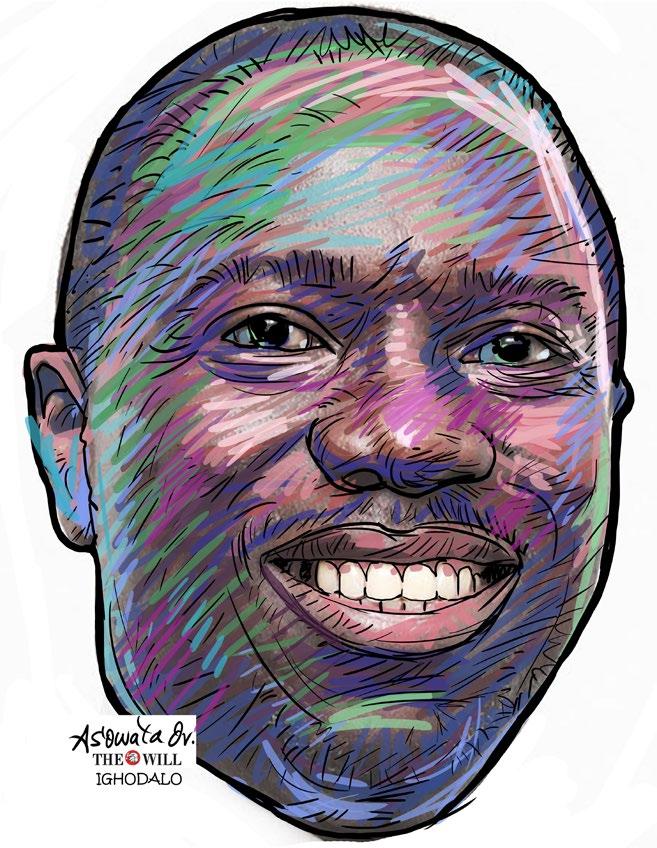
“About 23 accredited civil society organisations also said that the Independent National Electoral Commission, INEC, was compromised during the poll.
“On the integrity test, the 2024 Edo Governorship Election failed the electoral integrity test due to lack of transparency in the results collation process, which led to the manipulation of results,” they summarised.
The APC, however, said the PDP was crying wolf where there was none and asked the party to concede defeat.
On its part, the INEC washed its hands off any involvement in the alleged manipulation of the electoral process. According to the Chief Press Secretary to the INEC Chairman, Rotimi Oyekanmi, the Commission did not participate in vote-buying, a widespread issue linked to the actions of political parties and not the electoral body.
He said, “Vote-buying and alleged result manipulation are all tied to unscrupulous attempts to gain an unmerited advantage in order to win an election.
“INEC can and should not be held responsible for votebuying. We are doing our best to fulfil our expected roles. Other stakeholders should also play their part and stop undermining the electoral process.”
Then last Wednesday, thousands of Edo citizens took to the streets of Benin City on Wednesday, October 2, 2024, to protest the outcome of the September 21 governorship election, calling on the INEC to declare Dr Asue Ighodalo of the, PDP, the legitimate winner.
The protesters were seen brandishing placards with various inscriptions, such as ‘Edo PDP won the election but INEC and police colluded to change it’; ‘Dr. Asue Ighodalo, the governor – elect we know’; ‘INEC Stole PDP mandate’; ‘INEC sack Edo State REC’; ‘Stolen Mandate: How APC did it in oredo LG’; ‘13, 526 votes added to APC and 4, 335 votes taken from PDP’; ‘Donatus Etukido, Etsako East should be sacked’, among others
The protesters alleged widespread fraud, malpractices and irregularities in the electoral process, specifically accusing the Edo State Resident Electoral Commissioner (REC), Anugbum Onuoha, of manipulating the results in favour of the APC candidate, Senator Monday Okpebholo.
The PDP claimed that the INEC altered the results to favour the APC, sparking tensions and prompting a formal protest to the electoral umpire’s head office at Aduwawa, Benin City.
Ighodalo, the PDP candidate, has severally stated that the electoral process was heavily compromised, citing instances of result tampering and manipulation.
The protesters were seen brandishing placards with various inscriptions, such as ‘Edo PDP won the election but INEC and police colluded to change it’; ‘Dr. Asue Ighodalo, the governor – elect we know’; ‘INEC Stole PDP mandate’; ‘INEC sack Edo State REC’; ‘Stolen Mandate: How APC did it in oredo LG’; ‘13, 526 votes added to APC and 4, 335 votes taken from PDP’; ‘Donatus Etukido, Etsako East should be sacked’, among others.
The protesters urged INEC to take immediate action to address these concerns and ensure the integrity of the electoral process was restored. The situation was tense with many speakers calling for transparency and accountability by INEC.
At the INEC office where heavily armed police officers were stationed to maintain law and order, the protesters expressed their anger at the brazen manipulation of the Edo September 21 governorship election results.
The protesters in their numbers unequivocally reaffirmed and echoed that they all gave their mandate to Asue-Ogie of PDP and wondered why INEC subverted their mandate and gave it to the APC candidate.
They said the results uploaded to INEC’s IREV showed that PDP won and wondered why INEC bypassed the IREV, which was created to give credibility to elections in Nigeria, and declared another result.
The protesters also noted that although the electoral law, as amended, stipulates that INEC has seven days to review the result of an election before announcing it, the electoral umpire was in a hurry to announce and present the Certificate of Return to the wrong person. They demanded that the Certificate of Return should be withdrawn and issued to the rightful person, which is Dr Asue Ighodalo and that all the INEC officers involved in the electoral heist should be brought to book, among others.
They promised to continue the protest until justice was served.
The protesters were led by the PDP State Chairman, Dr Tony Aziegbemi, the PDP Campaign DirectorGeneral, Hon. Matthew Iduoriyekemwen and Rev Olu Martins, Deputy Director, Media, among others.
The protest started from Ring Road, which is the city centre, through Akpakpava Road to the INEC State headquarters at Aduwawa, Ramat Park, Ikpoba Hill, Benin City.
Meanwhile, the INEC has given a Certificate of Return to Okpebholo, who pledged to run an open and inclusive government in the state.
On Friday, the APC staged a thank you rally at Irrua, in Edo Central Local Government Area where Senator Okpebholo comes from. Senator Adams Oshiomhole and Okpebholo, who addressed the crowd thanked them for voting for the party and promised to develop the state for everyone.
The Independent Corrupt Practices and Other Related Offences Commission, ICPC, on Wednesday, said that over N13 billion in diverted public funds was recovered in September 2024.
According to the Commission’s Chairman, Musa Adamu Aliyu, “Over the past year, the ICPC has made significant progress in discharging its mandate. For example, we recovered over N13 billion in diverted public funds in September 2024 alone. This is just one of the many ways we have worked tirelessly to fulfil our mandate.”
From Aliyu’s statement on the Commission’s strategy and the institutions covered in its operation, it is easy to see how N13 billion could translate into stolen trillions of Naira over the months before September.
The Anti-Corruption and Transparency Units (ACTUs) in Ministries, Departments, and Agencies (MDAs), he said, are the monitoring mechanisms of the Commission.”
Public corruption stinks in Nigeria. ICPC’s one-month account disclosure is just a tip of the iceberg that has been on the rise for years without action.
For instance, in 2015, the Senate Public Accounts Committee (SPAC) indicted 59 out of 114 Ministries, Department and Agencies, MDAs, which had been queried by the Office of the Auditor-General of the Federation in its 2015 report. Some of the MDAs answered the summons of the Senate Committee, others shunned it, claiming that they had submitted reports to the Economic and Financial Crimes Commission, EFCC, and the ICPC. Five years later, the same story repeated
itself. This time it is a concern raised by a coalition of eight civil society organisations, which, unable to contain the stench in the MDAS and Ministries, raised the alarm over the cesspool that public corruption had become in the country.
The eight CSOs said their investigation showed that 160 MDAs and Ministries in the country were found to have failed to submit their financial statements or management reports to the Office of the Auditor-General. They urged the Federal Government to prosecute officials of Ministries and MDAs indicted by the audit reports submitted by the Auditor-General of the Federation
The CSO groups included Peering Advocacy and Advancement Centre in Africa (PAACA), Civil Society Legislative Advocacy Centre (CISLAC), YIAGA Africa, Centre for Transparency Advocacy (CTA), African Centre for media and Information Literacy (AFRICMIL), Yes Project, Social Action and Protest 2 Power.
Leaders of the groups are Auwal Musa Rafsanjani, CISLAC; Ezenwa Nwagwu, Say No Campaign; Jaye Gaskia, Protest to Power, Chido Onuma, AFRICMIL; and Samson Itodo, YIAGA Africa, made the call at a news conference on Monday in Abuja.
According to them, public corruption is a blatant disregard to constitutional provision of section 85 of the 1999 constitution and the financial regulation 321 (v), which mandates all parastatals to make such submission annually. They said, “Interestingly, 11 MDAs were reported to have submitted their financial statements or audited financial reports to the office of the AGF since inception. Yet, they have continued to enjoy resources appropriated by the National
Assembly and the Office of Budget and National Planning for subsequent years. The report also revealed acute financial mismanagement by MDAs and their failure to remit surplus funds, in billions, back to the country’s treasury.’’
According to them, the overwhelming recklessness of these MDAs and their chief executives have caused the country significant waste of time and resources, poor performance and also set the country backward economically and infrastructure-wise.
Obviously, the Ministries and MDAs and their officials are the culprits here for over almost two decades that this unending corruption has persisted. But more culpable is the entire government system that tolerates, sustains and encourages this corruption. Imagine the money that would have been looted since January 2024 if N13 billion was plundered in only one month!.
And here is our government that has made borrowing a matter of state policy when a determination to block wastages and prosecute corrupt officials would have saved the country billions.
Unfortunately, as has often happened in the past, the ICPC only disclosed its findings but never related what happened or would happen to the indicted Ministries MDAs and their officials. This is encouraging corruption. It is on this note that we demand that the ICPC releases the list of MDAs implicated in the latest discovery as a first step to overcoming this recurring issue of public corruption. Indicted officials should be prosecuted and the MDAs and officials made to return the stolen money. Enough of this media rigmarole that serves to boost the profile of anti-graft agency only to repeat itself again.

And here is our government that has made borrowing a matter of state policy when a determination to block wastages and prosecute corrupt officials would have saved the country billions. Unfortunately, as has often happened in the past, the ICPC only disclosed its findings but never related what happened or would happen to the indicted Ministries MDAs and their officials. This is encouraging corruption
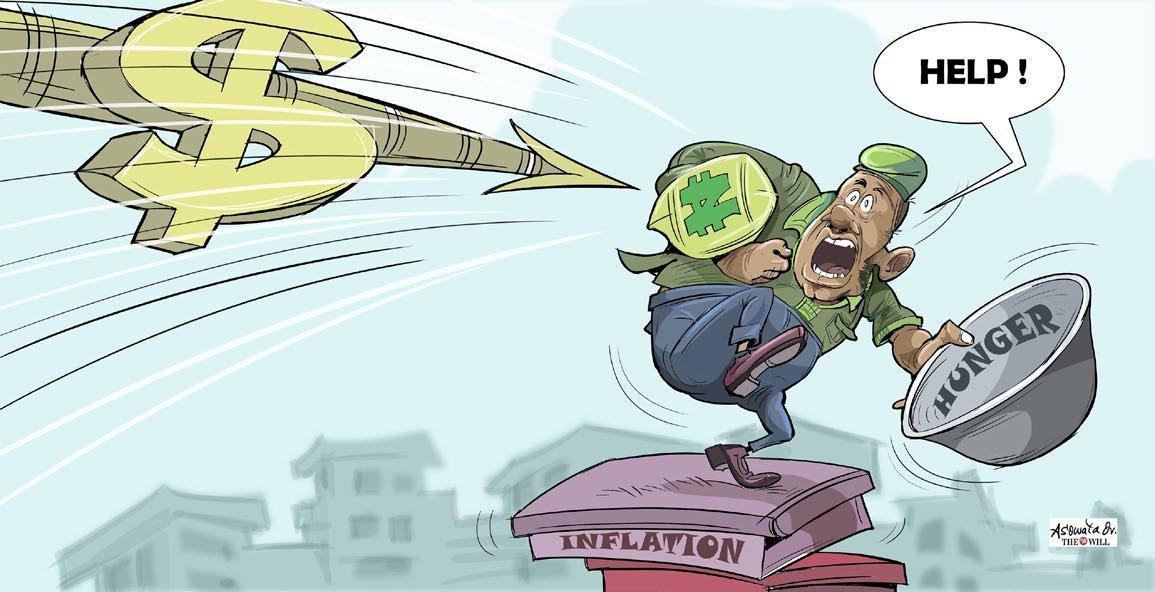


ABIODUN KOMOLAFE
n the midst of Nigeria’s complex economic and political landscape, meaningful conversations become crucial catalysts for change. My recent discussion with Bolade Agbola, a distinguished Agricultural Economist, stockbroker, banker and Business Administration doctorate holder, offered invaluable perspectives on the country’s pressing challenges. As we delved into the intricacies of Nigeria’s development trajectory, Agbola’s multidimensional expertise and cosmopolitan outlook shed light on the country’s potential pathways toward sustainable growth. This conversation serves as a timely reminder that Nigerians continue to seek solutions, driven by resilience and
In this article, I reflect on our insightful exchange, exploring critical themes and actionable strategies for Nigeria’s economic revitalisation. Let’s be frank, Nigeria faces complex challenges affecting citizens’ daily lives. Economic struggles, including inflation and unemployment, are paramount. Political stability and security are also pressing concerns, amid terrorism, banditry and kidnapping. This situation is unhelped by Boko Haram terrorism, which has exacerbated security issues since the early 2000s. To alleviate these, Nigerians are seeking economic growth, a stable currency and reduced poverty. Despite the noises of despair, Agbola shared his optimistic vision for Nigeria’s future, citing potential milestones achievable by next year. He predicted that domestic petrol refining would increase, easing foreign exchange pressures. In his words, “This time next year, the inflationary rate would drop below 20 per cent and race towards single digits. Security concerns would also diminish as
Not done yet, he emphasised the importance of state policing and local government autonomy in enhancing security. Agbola also predicted that economic fundamentals would improve, driving the naira exchange rate below N1,000.00/$1. ‘E lo f’okan bale! The economy will soon witness a positive turnaround’, he concluded reassuringly! Obviously, Agbola’s perspective on “This time next year” showcases humanity’s capacity for resilience, optimism and community solidarity. By embracing the present, this mindset inspires collective action toward a brighter, more equitable future. But then, this time next year, the journey to 2027 will have begun in earnest. Regardless of government policies, one doesn’t need to be a genius, an econometrician, or a Nostradamus before knowing that, given current economic trends, the dollar-naira exchange rate is unlikely to drop below N1,000.00, which is in a bestcase scenario. His other predictions, while optimistic, may similarly face significant hurdles, including
infrastructure gaps, regulatory frameworks and global market fluctuations.
According to Nigeria’s National Bureau of Statistics, inflation rates have consistently exceeded 20 per cent since 2020. Therefore, achieving single-digit inflation by 2027, as Agbola predicted, would require significant policy shifts and economic reforms. Furthermore, his emphasis on domestic petrol refining overlooks the need for comprehensive energy sector reforms. To address this, Nigeria must prioritise investment in renewable energy sources and grid modernisation. Talking seriously, Nigeria is currently grappling with a balance of payment crisis; and, when one has a balance of payment crisis, one’s response will be like that of Jawaharlal Nehru in 1958, when there was not much for India to export; or, Harold Wilson in 1967, when Britain’s was more of currency crisis. Nehru’s quote, echoed by Wilson, remains relevant: “We have to export or perish”, thus emphasising the need for exportdriven solutions to rectify economic imbalances. Under the circumstances, President Bola Tinubu should have prioritised exports from the outset, more so as competitive institutions are crucial to Nigeria’s success.
However, the decision to float the naira without diversifying production and strengthening institutions has been calamitous. Addressing these institutional deficits should have been the first order of business. To get out of the current economic challenges, the government needs to rethink its export strategies to mitigate the currency turmoil and alleviate the cost of living crisis. The ‘Soludo Solution’ merged cooperative banks into larger institutions, neglecting their potential as specialised financial intermediaries for farming cooperatives and hundreds of agricultural associations. Simply put, while temporary relief may come from global interest rate cuts, it is insufficient as speculative investments seeking high returns won’t drive sustainable growth or employment, even if the Central Bank of Nigeria (CBN) cuts interest rates in the next few days. Instead, Nigeria should prioritise production and modernise its agricultural sector to create jobs and boost exports. The Netherlands’ success story offers valuable lessons, attributing its prosperity to two key factors: specialised financial institutions like RABOBank, which was credited with knowing everything that’s worth knowing about agricultural finance, and world-class agricultural research institutions. These two elements are intricately linked. In contrast, Nigeria presently struggles with inadequate agricultural financial institutions and research entities, and these have been hindering its progress. A comic interlude comes from reports that the Cocoa Research Institute of Nigeria (CRIN) allocated funds for urban solar-powered streetlights. In a twisted harmony like ours, where contradictions blend into a unique melody, this is a tragic-comic illustration and the complete absence of interest in the development of agriculture.
In Nigeria, hope is vital amid economic uncertainty. Drawing from Prophet Elisha’s wisdom (2 Kings 4: 1-7), Nigerians can develop innovative solutions and collaborative problem-solving. Just as the people of Samaria persevered through famine and siege, Nigerians have continued to show remarkable strength in the face of economic instability, political turmoil and security threats. For Nigeria to achieve progress, strategic economic plans, addressing security concerns, strengthening institutions, promoting transparency and accountability in governance are essential. Across centuries, development has typically begun with a strong foundation at the local or community base.
BY KOLA OREDIPE
The excitement and joy that came with the announcement of the creation of Bayelsa State on October 1, 1996, knew no bounds. All over Nigeria and in the diaspora, the Ijaw people celebrated the eventual recognition of the ethnic nationality after years of collective struggles and hard work by the leaders for a homogenous Ijaw State. It was no doubt a momentous occasion for all sons and daughters of Bayelsa State. It was a dream come true to satisfy the yearnings of all Ijaw people, unarguably the fourth largest ethnic group in Nigeria. The story of the creation remains very inspiring and emotional as the people gradually occupy their rightful place in the Nigerian political space.
The young, women and men participated actively in the long processes that led to the birth of Bayelsa State by the instrumentality of the authority of the late Head of State, General Sani Abacha. The heroic efforts of the founding leaders will continually be acknowledged in the annals of Bayelsa State. History will be kind to the Nigerian Civil War hero and Kaiama-born late Major Isaac Adaka Boro, for his bravery to demand equity and self-determination by the Niger Delta, a revolution that set the stage for a call for a homogenous Ijaw State of Bayelsa. Twenty-eight years after Bayelsa was created from old Rivers State, this year’s anniversary presents a momentous occasion to reflect on the growth and development of the state and its political journey.
Fact is fact! That Bayelsa State has witnessed tremendous growth in these past years is indeed true and not a ruse. Under successive administrations from 1996, the trajectory of development has been amazing. The level of infrastructure notwithstanding the high expectations of the people could never be compared to the era preceding the creation.
Interestingly, four military administrators and five civilian governors had presided over the affairs of the state and each had made his own valued contributions. The current Governor, Senator Douye Diri, has taken up the mantle but it must be noted that the first civilian governor, the late Chief Diepreye Alamieyesiegha; former President Dr. Goodluck Jonathan; Chief Timipre Sylva; and the immediate past Governor, Seriake Dickson, performed to the best of their abilities. Government is indeed a continuum. There are great stories across Bayelsa State and the people freely share such in terms of infrastructural development, including roads, education, health, stadium, rural development, economic development and human capacity building. Today, there are three universities, polytechnics, a college of education, other institutions, health facilities, hotels, night clubs, federal agencies and several roads within and outside Yenagoa. Before creation, there were no roads to several communities, particularly the riverine places.
Today, the Amassoma community is not only connected by road but it is hosting the Niger Delta University. It is the same story with several communities in both Sagbama and Ekeremor Local Government Areas where Bolu-Orua, Ebedebiri, Toru-Orua, Angalabiri, Ofoni, Ayamasa, Aleibiri, Isampou and Ekeremor main town have all been linked by roads. The people of Nembe no longer travel by water from Yenagoa or Ogbia main town as a road has connected them. That is development and it is interesting to note that the road is further going to Brass Island. And someone will still say, no development has happened in Bayelsa State.

TWENTY-EIGHT YEARS AFTER BAYELSA WAS CREATED FROM OLD RIVERS STATE, THIS YEAR’S ANNIVERSARY PRESENTS A MOMENTOUS OCCASION TO REFLECT ON THE GROWTH AND DEVELOPMENT OF THE STATE AND ITS POLITICAL JOURNEY
What will any critic of Bayelsa progress tell citizens of ancient Angiama town in Southern Ijaw LGA, home of one of the founding fathers, Late N. A. Frank-Opigo, when they remember the pre-creation? Now they safely drive to Angiama from Swali in under 20 minutes, a place hitherto accessed by boat in a journey not less than 40 minutes on speed boat. Is that not grade-A development? Looking at the level of development in the State, the pace of transformation of Yenagoa city as the capital of Bayelsa State is better imagined by those living in the area before state creation, where Yenagoa was merely a local government headquarters. Today, the single-lane road into Yenagoa and former footpaths have paved ways for three to four dual carriages, internal roads and modern buildings now dot the state capital, and many other new infrastructures all over. Certainly, the trajectory of development of the state has surpassed the expectations of many people coupled with the political journey, which threw up Dr. Goodluck Jonathan as the first minority from the South-South to become Vice President and subsequently the President of the Federal Republic of Nigeria. A political win for the South-South people who had complained of political neglect and injustice over the years. Taking the baton from the Restoration Government of Senator Seriake Dickson, who left an indelible mark after 8 years in office, incumbent Governor, Senator Douye Diri, has left no one in doubt as to his capacity to steer the ship of the state in the right direction to meet the aspirations of the founding fathers.
He is pursuing an urban renewal programme to build a befitting state capital, provision of affordable housing schemes, health care, improved power, education, economic development, industrialisation, youth and women empowerment and sports development. The civil service is already feeling the impact of the Prosperity Government since February 2020 with timely and regular payment of salaries and pensions. In his first four years, the Prosperity Administration initiated new projects and completed a number of inherited ones across various sectors. There were projects hitherto considered suicidal under previous administrations in terms of cost and duration. But Gov. Diri has bell the cat to initiate such projects as the construction of the Nembe-Brass road and the construction of a bridge across River Nun as a component of the Yenagoa-Oporoma-Ukubie road.
20.30bn
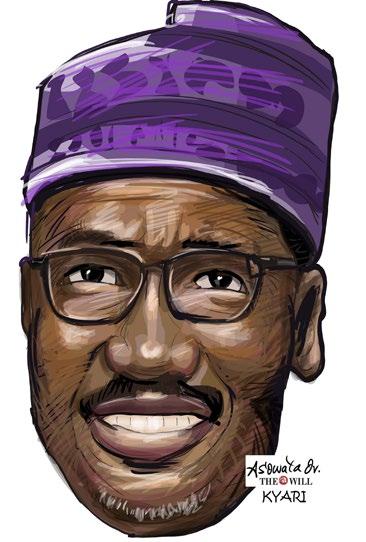
Without a functional refinery, Nigeria imported a total of 20,3 billion litres of petrol in 2023, according to data by the National Bureau of Statistics (NBS). This translates to an average of 55.8 million litres per day.
The figure represents a 13.7 percent drop relative to 23.54 billion litres imported in the previous year – 2022.
The NBS in its Petroleum Products Distribution Statistics for Full-Year 2023, stated, “In terms of imported products, 20.30 billion litres of Premium Motor Spirit (PMS) were imported in 2023 relative to 23.54 billion litres in 2022, showing a decrease of 13.77 per cent.”
Presenting the data in truck haulage, the NBS said, “In 2023, PMS truck out stood at 20.22 billion litres, indicating a 16.96 per cent decrease relative to 24.35 billion litres recorded in 2022.”

EDITOR Sam Diala
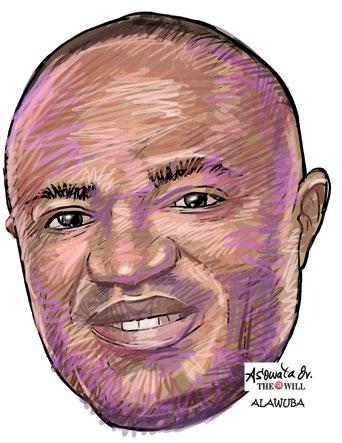
Africa’s Global Bank, United Bank for Africa Plc, recorded N106.1 billion in e-banking revenue on a strong financial inclusion drive. This constitutes a 107.8 percent growth compared to the N51 billion posted in HY 2023, according to its audited financial statement for the period ended June 30, 2024.
The e-banking income includes revenue from electronic platforms, such as mobile applications, USSD channels, Internet banking, ATM, PoS as well as other debit and credit card transactions.
The revenue haul in technology-related operations of the bank reflected in the Fees & Commission Income which showed an exponential growth of 92.4 percent during the review period from N124.9 billion in HY 2023 to N250.6 in HY 2024. The e-banking revenue was the largest component accounting for 42.3 percent of the total Fees & Commission Income segment during the period.

The report further disclosed that local production of kerosene and diesel was stepped up during the year, without indicating the facilities that created the
Continues on page 15
A further look into the financial statements of the group showed that e-banking expense also recorded a growth trajectory to N83.1 billion from N41.4 billion in the corresponding period, reflecting an increase of 100.5 percent. It also constituted 78.8 percent of the total N105.5 billion Fees & Commission Expense posted in the review period against N47.6 billion in HY 2023.
THEWILL records that the Tier-1 financial institution group has maintained the lead in e-banking revenue in the
industry following outstanding commitment towards bringing banking to digital age. The recent performance points to over 100 percent growth likely to occur in the current year-end compared to the N125.57 billion achieved in FY 2023.
UBA is not left out among the Nigerian banks that have increased the tempo of their digital operations towards superior service delivery as competition among them intensifies. The move is aimed at deepening financial inclusion and also reducing emphasis on cash transactions. It also marks a significant step toward enhancing the self-sufficiency of Nigeria's payment infrastructure promoted by the Nigeria Inter-Bank Settlement System (NIBSS).
The Group Managing Director of UBA, Dr Oliver Alawuba, attributes the bank’s impressive HY 2024 performance to the adoption of technology and data analytics among other factors. Alawuba, who made this disclosure during the bank’s recent Investors’ Conference, stated that despite global economic challenges, including high inflation and political instability across some regions in Sub-Saharan Africa, UBA achieved double-digit growth, strengthening its position in the banking industry.
He stressed that as UBA enters the second half of the year, it does so from a position of strength, noting that the bank is wellpositioned to continue its growth trajectory, with an emphasis on market leadership and customer satisfaction anchored to
Continues on page 15

UBA’s investment in technology and innovation has paid off significantly, as income from digital banking and payments saw a dramatic increase, with fund transfer fees rising by 188.7 per cent and remittance fees jumping by 228 per cent
cutting-edge technology.
UBA recorded strong growth across all key metrics in HY 2024.
Profit Before Tax surged to N401.6 billion which Alawuba said reflected an impressive reflection of the bank’s effective risk management despite macroeconomic pressures.
Customer deposits grew by 34 per cent, increasing from N17.4 trillion at the end of 2023 to N23.2 trillion in H1 2024, a sign of strong customer trust and loyalty.
Total assets rose by 37 per cent, reaching N28.3 trillion, up from N20.7 trillion at the end of 2023. Net Interest Income experienced significant growth, expanding by 143 per cent year-on-year to N675 billion, further demonstrating the bank’s strength in its core banking operations. Further breakdowns showed that in digital banking, UBA reported a 107.8 per cent year-on-year growth in income, highlighting the bank’s leadership in digital transformation and financial inclusion.
On digital banking and innovation, UBA’s investment in technology and innovation has paid off significantly, as income from digital banking and payments saw a dramatic increase, with fund transfer fees rising by 188.7 per cent and remittance fees jumping by 228 per cent.
Alawuba emphasised that UBA’s strategy of leveraging technology and data analytics is a key driver of this growth, helping to boost financial inclusion across Africa.
United Bank for Africa (UBA) Plc is the second largest Nigerian bank in terms of asset size, with a total asset size of N28.3 trillion. The bank has over 1000 touchpoints across the 24 countries where it is domiciled, however, the bank has 451 branches across Nigeria’s 36 states and the FCT.
UBA has a staff strength of over 10,000, with over 5,900 in UBA Nigeria.
Data by the Nigerian Exchange Ltd (NGX) showed that UBA closed its last trading day (Friday, October 4, 2024) at N27.35 per share on the NGX, recording a 1.3 percent gain over its previous closing price of N27.00
UBA began the year with a share price of N25.65 and has since gained 6.63 percent on that price valuation, ranking it 79th on the NGX in terms of year-to-date performance. Shareholders can be optimistic about UBA knowing the stock has accrued 15 percent over the past four-week period—29th best on NGX.
UBA stunned the stock market on Monday, September 30, with the announcement of a record-breaking N2 per share interim dividend for its shareholders. This development, which marks the highest interim dividend payout among Nigerian banks in the first half of 2024, has been applauded by stakeholders and industry experts.
commodities and where they are located.
“About 69.71 million litres of Household Kerosene (HHK) were locally produced in 2023 compared to 44.68 million litres in2022, indicating a growth rate of 56.02 per cent over the period.
“For Automotive Gas Oil (AGO), 109.39 million litres were locally produced in 2023, higher, compared to 102.47 million litres reported in 2022. This represents a 6.76 per cent growth rate,” the report stated.
Also, 4.94 billion litres of Automotive Gas Oil were imported in 2023, indicating an increase of 23.66 per cent compared to 4.00 billion litres in the previous year.
Nigeria has been showcasing four dormant refineries for almost three decades which constitute a conduit for siphoning public funds by the leaders who engaged in endless repairs of these facilities.
The National Assembly in a show of empty and vague legislative responsibility have constituted panels to investigate the over N11 trillion spent in fixing the dormant refineries without any results.
In an apparent state of bewilderment stemming from what stakeholders and industry experts ascribed to ineptitude and corruption, the Nigerian National Petroleum Company Limited (NNPC) has made a detour on the endless route towards fixing the nation’s dormant refineries which have consumed over N10 trillion without producing a drop of petroleum products.
The nation’s oil company had in the last 12 years embarked on the turnaround maintenance of the four refineries – in Port Harcourt (two plants), Warri and Kaduna – with countless promises of fixing the facilities to end the notorious practice of importation of petroleum products.
However, in a dramatic turn of events, the NNPCL on August 30, 2024 announced that it was seeking private Operations and Maintenance (O&M) companies to bid for the Warri and Kaduna refineries (while repairs of the Port Harcourt refinery are in progress).
With Dangote Refinery commencing actual production on September 3, and distribution on September 15, 2024, it is now clear that Nigerians have begun to enjoy the availability of locally refined petrol – after about 28 years.
The 650 barrel-per-day Dangote Refinery is not only a gamechanger, but an eye-opener: Nigerian leaders were not willing to end importation of petrol, or enthusiastic about fixing the local refineries.
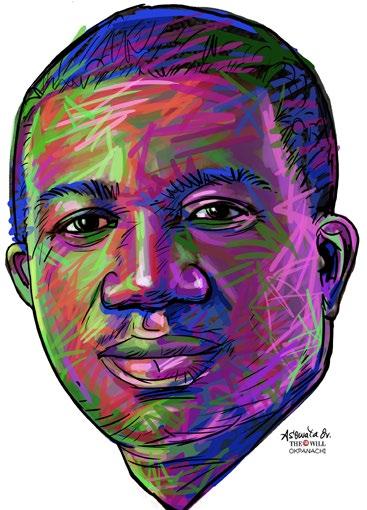
Stakeholders and industry experts have applauded the role of the Development Bank of Nigeria (DBN) in providing a forum for exchange of ideas among operators of micro, small and medium enterprises (MSMEs).
They maintain that such avenues provide the necessary window to identify problems bedeviling the MSME sector and articulate solutions for them.
These views were expressed by stakeholders who spoke to THEWILL on the recently concluded DBN’s annual lecture held for MSMEs in Abuja. Mr Jonas Okunuga, a poultry farmer, said MSME operators need adequate knowledge of their business and the environment to succeed, adding that finance is not the only critical success factor in their activities.
“While every business requires capital in the form of money, equipment or material, the knowledge of the business and what is happening in the macroeconomic space is important. That is why I urge every entrepreneur to expose himself to modern techniques of business administration,
including managing money, men and material”, Okunuga said.
Mike Ikeokwu, a vehicle spare parts dealer, noted that the days of bragging with the capacity of being a hustler are over. He said, “in the past, people brag that they are hustlers, and that they made it through hustling. All that is changing now. These days, you need knowledge and adequate information about what concerns you, your business, your environment, even your country, to do a successful business.”
“If Development Bank of Nigeria is providing financial support and adding knowledge to it, then they are doing the right thing, not like the other banks whose interest is the high interest they impose on people that borrow from them,” he said in a chat with THEWILL.
In his opening remarks at this year’s annual lecture, DBN’s Managing Director/CEO, Dr Tony Okpanachi, called for increased support from key institutions in Nigeria, including the government and the financial services sector, to boost the growth of the MSMEs.
He stressed the critical role MSMEs play in Nigeria's economy, underscoring the need
for more concerted efforts in alleviating the financial constraints and other challenges facing MSMEs and small businesses in Nigeria.
“As Nigeria’s primary development finance institution, we at DBN recognise that the current global economic climate presents a formidable challenge to MSMEs, particularly in Nigeria where rising production costs, inflation, unstable exchange rates, and disruptions in the global supply chain affect output,’’ he stated.
Since its inception in 2019, the DBN Annual Lecture has served as one of the numerous initiatives by the Bank to stimulate an enabling environment for MSMEs to thrive, particularly amidst global, regional and national socioeconomic and political headwinds.
This year’s event, themed "Empowering Nigerian MSMEs in a Challenging Global Landscape," brought together top industry leaders and financial experts to discuss strategies to empower MSMEs in Nigeria.
Dr. Okpanachi commended the federal government for its ongoing initiatives to create an enabling environment for MSMEs.







N650, 000
N600, 000
N500, 000
N440, 000
N395, 000
N335, 000
N310, 000

N410, 000

N380, 000
N320, 000
N315, 000
N280, 000
N145, 000
N85, 000
N70, 000
N160, 000
N95, 000
N65, 000
N60, 000
N50, 000
N30, 000
N15, 000
N7, 000
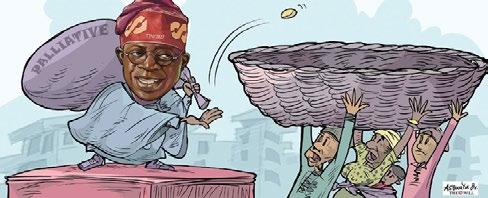












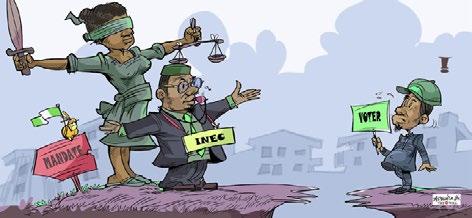










A D V E R T I S E M E N T R A T E EFFECTIVE APRIL 1, 2024
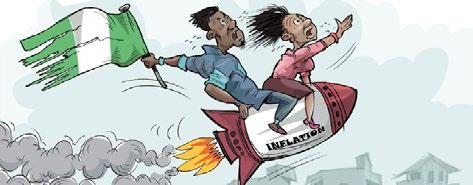


Half Page Front – N10, 000, 000
Front Page 5X6 – N5, 000, 000
Front Page Strip– 4x6 – N1, 400, 000
Front Page Strip 3x6 – N800, 000
Change of Name (Classified) N5, 000 Page/Column Branding – Negotiable




























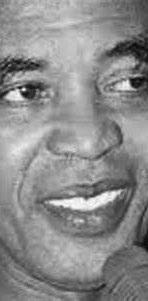







Since Nigeria gained independence on October 1, 1960, through despotic military regimes to democratic administrations, a number of vociferous individuals have kept the faith in championing the cause of a better Nigeria.
The journey to democracy has no doubt been marked by twists and turns, with civil, human rights activism playing a pivotal role in shaping the country’s political landscape. The tumultuous years of military rule made these individuals relentlessly and tirelessly push for justice, equality, and accountability. Their voices were a beacon of hope and their unwavering commitment to justice inspired several other activists. Despite significant progress being made of uninterrupted democratic experience, the country still confronts numerous human rights challenges, occasioned by endemic corruption and rising insecurity. Still basking in the euphoria of Nigeria's 64th independence anniversary, Ivory Ukonu shines the spotlight on some of those bold, audacious and brazen names synonymous with the struggle for a better country.

Ken Saro-Wiwa at the military tribunal days before his execution
Kenule Saro-Wiwa was a writer, businessman and environmental activist best remembered for his famous quote, "I tell you this, I may be dead, but my ideas will not die.” Even though he became an activist towards the end of his life, he always believed in one Nigeria and was proud to be a Nigerian. He stood against ethnic undertones. He wanted to help create a country where all Nigerians have equal access to state support. His poems, books and other works, such as his long-running satirical TV series 'Basi & Co' simply told the story of Nigerians being Nigerians. It was impossible to tell which ethnicity any of the characters on the TV drama series were. In 1990, years after serving as the civilian administrator for Bonny Camp during the Nigerian Civil War, Saro-Wiwa started to dedicate himself to the amelioration of the problems of the oil producing regions of the Niger Delta. He focused on his homeland of Ogoni, a minority ethnic group; and launched the Movement for the Survival of the Ogoni People (MOSOP), to campaign for social, economic, and environmental justice in the Niger Delta of Nigeria.
He spoke out against the Nigerian military regime and the Anglo-Dutch petroleum company, Shell, for causing environmental damage to the land of the Ogoni people in his native Rivers State.
Despite various campaigns by the military government, Saro-Wiwa stayed resilient in pursuing his mission and as a result of mounting protest, Shell suspended operations in Ogoniland in 1993. He was executed on November 15, 1995, along with eight other members of MOSOP, after the military regime of late General Sani Abacha found them guilty, via a secret trial, of the murder of four Ogoni elders during a political rally. Later known as the 'Ogoni Nine', the accused denied the allegations, insisting they were being framed. Nigeria was suspended from the Commonwealth the day after the execution, following international condemnation of the executions. The country didn't return to the Commonwealth fold until May 1999 when it returned to civilian rule.
There are a few women in Nigerian history who are as commanding or accomplished as Funmilayo Ransome-Kuti, a women's rights activist and pioneer African feminist who was fondly referred to as the ‘Lioness of Lisabi.’ She was part of delegations SENT to discuss the proposed national constitution. Her contributions to Nigerian society as a feminist and women’s rights activist are immense and present to this day. In the 1940s, she co-founded the Abeokuta Women’s Union, AWU, which led a women's protest against colonial taxation in 1946 and consequently, the abdication of the Alake of Egbaland, the traditional ruler of Abeokuta.
The AWU later recorded membership of some 20,000 local women, later going national as the Nigerian Women’s Union. But that was just the beginning. Funmilayo also co-founded the Nigeria Union of Teachers (NUT) with her husband, Reverend Israel Oludotun Ransome-Kuti. Her influence extended into the political sphere as a founding member of the National Council of Nigeria and the Cameroons Party (NCNC), one of the leading political forces in Nigeria's fight for Independence. She also became the first woman appointed to the Western House of Chiefs, marking a groundbreaking moment for women in Nigerian politics. She established many schools around Southern Nigeria and constantly remained a resilient force for women’s rights throughout her life. She died from coma complications in 1978 after soldiers threw her from the second floor of her son Fela’s Lagos home during a 1977 raid.

Gani Fawehinmi
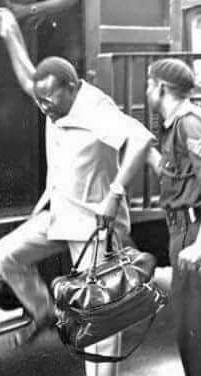
Although human rights lawyer, activist and a former presidential candidate, Abdulganiyu Oyesola Fawehinmi desired to become a successful lawyer, it was until he started practising that he soon realised that he also wanted to affect the lives of everyday Nigerians and leave a legacy of impact. And he did exactly that. Often representing those who couldn’t afford his services, Fawehinmi quickly became known as 'the people’s lawyer,' taking on a great number of pro bono cases over the course of his career.
Fawehinmi played the role of human rights campaigner for 40 years, constantly provoking military rulers and defending their victims. His brushes with the authorities earned him frequent detentions and beatings. His passport was confiscated several times and on one occasion his books were seized and his library set on fire. He believed in media freedom, contributed avidly to newspapers and often took on journalists’ cases. Most notable of these was the still unsolved case of Dele Giwa, a magazine editor killed by a parcel bomb in 1986. Fawehinmi sought to re-open the Dele Giwa case and called on the then attorney-general of the federation to be removed for his indifference to corruption. He spoke vehemently against each successive government that assumed power either by rigging elections or by military usurpation and publicly condemned looting, brigandage, perversion of values, ethnic politicisation, insensitivity, spurious economic and financial maladjustments in government circles. For this, in 2008, he rejected one of the highest national honours that can be bestowed on a citizen by the Nigerian government – Order of the Federal Republic (OFR) – in protest of the many years of misrule since Nigeria's independence. He felt he could effect change on a much larger scale and decided to contest for the number one office of the land in 2003 on the platform of the National Conscience Party of Nigeria. His dream didn't come to fruition. He died a disappointed man in 2009 after a long battle with cancer, still resilient as ever over the state of Nigeria.



An advocate of peace and happiness, musician and activist, Fela Aniukulapo-Kuti was not only famous as a musician, he used words as a form of protest and resistance and also as a means of reflecting and commenting on political events. As he rose to prominence throughout the 1970s, he caused a change in the relation between music as an art form and Nigerian socio-political discourse. Fela performed three times a week at his Afrika Shrine club from Friday to Sunday, with the Friday show, dubbed the 'Yabis Night,' drawing the largest crowds. On 'Yabis Nights,' he would diligently point out a new government effort, typically a different effort each week, highlight its failings and then break into his legendary free-flowing Afrobeat. Due to his opposing views, he was routinely arrested and beaten, with soldiers frequently conducting raids on his Lagos based home cum entertainment centre which he named the Kalakuta Republic. In 1977 soldiers raided the Kalakuta Republic under the pretext of an anti-drug operation, burning several houses and beating up occupants. When his mother, Funmilayo Ransome-Kuti died from complications of a fall after been thrown down from the second story of one of the buildings by the military, Fela put her body in a coffin and took it to the gates of Dodan Barracks in Lagos, which was the seat of power in the military regime at that time, in an incredible act of defiance. He was a blunt supporter of human rights, and many of his songs were direct attacks against dictatorships, specifically the military governments of Nigeria in the 1970s and 1980s. He was also a social commentator, and often criticised Africans, especially the upper class for betraying traditional African culture. Since his death in 1997, Kuti’s legacy lives on and has birthed a new generation of activists who idolise his resilience in fighting the tyranny of the system.
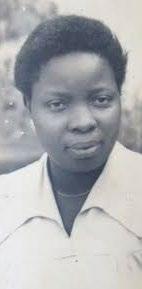
Elizabeth Adekogbe a nationalist, journalist, teacher, and staunch activist, was the founder and leader of the Women’s Movement of Nigeria, an organization which championed for the rights of women in political, social, and economic spaces and National Council of Women Society, a dominant pressure group and a leading women's coalition in Nigeria. She worked hand in hand with Funmilayo Ransome-Kuti and several other pioneering women towards Nigeria’s independence struggle. Adekogbe dedicated her life to creating opportunities for women in political spaces. One of the many things she fought for was women’s suffrage and the allocation of seats for women in legislature. Adekogbe frequently wrote articles focused on women’s issues.
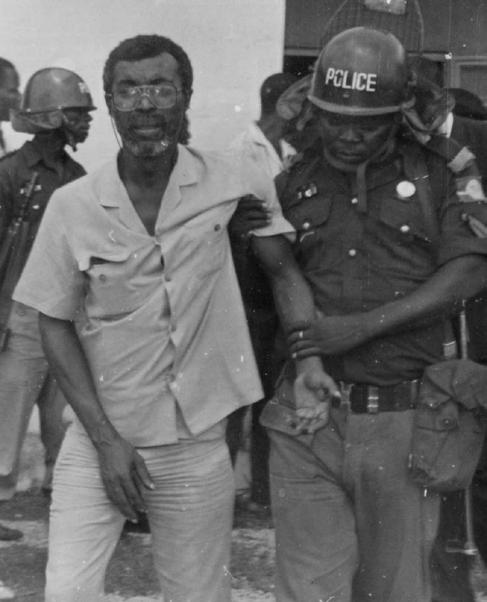
Although he was a medical doctor, he was like his mother, Funmilayo Ransome-Kuti and his brother, Fela Anikulapo-Kuti, deep into activism. He was also a human rights campaigner and one of Africa's bravest freedom fighters. His quiet determination to confront arbitrary rule and grand corruption led to his jailing by a succession of military regimes. The charges against him were usually trumped-up variants of sedition. The most ludicrous charges included, but not limited to faxing defendants' statements to persons unknown, trying to manage an unmanageable society, amongst others. Both charges earned him a double life sentence under the military regime of late dictator, General Sani Abacha in 1995. One of the defendants whose statements Beko was alleged to have faxed was former president Olusegun Obasanjo, who had been accused of coup plotting by Abacha. Tried in a kangaroo court, Beko was thereafter incarcerated. After Abacha's death, he went fully into grassroots activism. Softly spoken, modest and with a total lack of interest in material status, Ransome-Kuti contradicted clumsy stereotypes of Nigerians. Beko threw himself into organising Nigeria's doctors in the Nigerian Medical Association, NMA, his immediate constituency and trying to raise the standards of public health care. That led him into conflict with both civilian and military regimes. In 1984, the military regime under former General Muhammadu Buhari introduced State Security Decree 2, allowing the military rulers to detain indefinitely anyone they declared to be a threat to national security. Within a year, the Buhari regime had banned the medical association and jailed Beko. This was the beginning of the medical flight of Nigeria's medical personnel. On his release, Beko appalled by the tens of thousands of Nigerians detained indefinitely without charge, joined with a group of lawyers to set up the Committee for the Defence of Human Rights in 1989. After relentless protests, the committee secured the release of thousands of innocents but usually desperately poor prisoners. His clinic in Lagos became the headquarters for one of Nigeria's leading civil rights movements - the Campaign for Democracy - calling for the military to give way to an elected government. Crowded with Nigerians seeking help, the clinic doubled as a legal advice bureau. He was a board member of the Commonwealth Human Rights Initiative along and he would often press the organisation to take a more critical stance towards member states. Under former General Ibrahim Babangida's regime there was pressure from within its own ranks as well as millions of frustrated Nigerians who were opposed to military rule. Beko and fellow activists started demanding a national conference to reform the federal constitution at which Nigeria's 300-odd ethnic groups would be represented. They protested around the country, urging the soldiers to stand down. This was too much for the Babangida regime, which sent 200 soldiers to arrest Beko. He was eventually freed. He remained undeterred and continued to be a trenchant critic of both military and civil regimes in Nigeria until his death. His last years were spent organising the Centre for Constitutional Governance, whose aim was to help citizens hold the government to account at all levels and to fight corruption. But years of solitary confinement, ill-treatment and denial of medication took their toll on his health.
Fearless and unrelenting, Hajia Gambo Sawaba stood as a voice for the oppressed, challenging societal norms and defying injustice. Her activism against child marriage, forced labour, and oppressive taxes saw her imprisoned a staggering 16 times, earning her a place in history as one of the most jailed women in Nigeria. At just 17, Sawaba entered the political arena, becoming the Great Nigeria People's Party (GNPP) deputy chairman and leading the Northern Element Progressive Union (NEPU) women's wing. Her work focused on advocating for women's education and political participation, forever altering the landscape of women's rights in Nigeria.
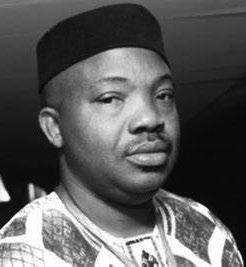
election. He was among the spokespersons of the Southern and Middle Belt Leader's Forum (SMBLF). Despite being a spokesman of former president Muhammadu Buhari when he contested the 2011 Nigerian presidential election under the defunct Congress for Progressive Change, he was also a strong critic of Buhari's government during his second coming and an even stronger one of President Bola Tinubu, long before he took a shot at the presidency. Odumakin was a courageous and principled man who was never afraid to express his views on any issue during his lifetime without fear of consequences. He died from respiratory issues due to complications resulting from COVID-19 at Lagos State University Teaching Hospital on 3 April 2021.

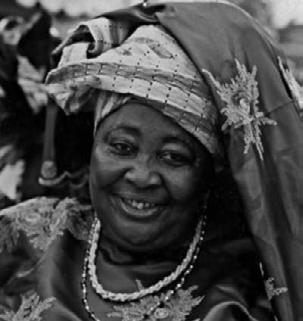
Ayodele Oluwatumininu Awojobi also known by the nicknames - Dead Easy, The Akoka Giant and Macbeth, was an academic, author, inventor, social crusader and activist. He was considered a scholarly genius as his research papers, particularly in the field of vibration, are still cited by international research fellows in Engineering and are archived by such publishers as the Royal Society. He became an activist in the wake of the presidential election results that returned the incumbent, Shehu Shagari as president in the Second Republic. He became very vocal in the national newspapers and magazines, going as far as suing the Federal Government of Nigeria for what he strongly believed was widespread election rigging. With all his court cases against the federal government thrown out of court, he delved into the law books, himself being only a mechanical engineer, claiming that he would earn his law degrees in record time, to enable him to better argue with the opposition at the federal courts. He used the universities as a bastion, going from campus to campus to make speeches at student-rallies, hoping to sensitise them to what he perceived as the ills of a corrupt government. Awojobi authored several political books over the course of his ideological struggles against a corrupt Federal Government.


STORIES BY IVORY UKONU

The last has not been heard of the conflict involving Babatunde Gbadamosi, a former Lagos State governorship candidate for Action Democratic Party and candidate for the People's Democratic Party (PDP) in the October 2020 Lagos East Senatorial district bye-election and his now estranged wife. Gbadamosi is claiming that he owns Redbrick Homes, the parent company of AMEN Estate. THEWILL had reported how he was kicked out of his matrimonial home two years ago for allegedly knocking up a certain Yinka Balogun, a United Kingdom based Nigerian lady who is an accounting and finance specialist. His supporters however claim that his ex-wife's overbearing and nagging attitude coupled with how often she rubbed in his face the fact that she was wealthier than him, was the panacea to his action.
Before the crash of the marriage, the couple projected the image that Babatunde was the brain and the financial muscle behind Redbrick Homes International Limited. When the marriage crashed, Shade took back control of her business, asserting full authority as the chairman/CEO.
Following the crash of the marriage, AMEN Estate became a subject of litigation as Gbadamosi dragged Shade to court over joint asset sharing. He also challenged in court his resignation as director of Redbricks Home International Limited despite signing his resignation in front of his two counsels, Shade's counsels and a notary public. He claimed he resigned under duress. He even warned prospective clients of the estate to stay clear of the estate as the suit challenging his part ownership of the estate was pending in court. Shade dismissed the claim, insisting that Gbadamosi was nothing more than a mere sleeping partner who did not have a single financial commitment in the business and had voluntarily
Continued from page 18

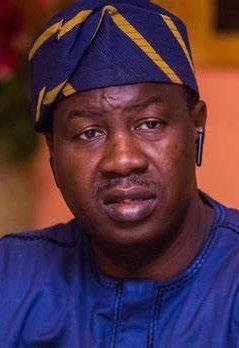
resigned from his position as a director of the company in July 2021 all of which could be verified at the Corporate Affairs Commission. She further described him as an impostor. But Gbadamosi isn't relenting. He recently went public again claiming ownership of Redbrick Homes International Limited. This time, Shade's lawyers, the law firm of Babalakin & Co, lawyers who also double as lawyers to Redbrick Homes International Limited and Ashlead Estates refuted his claim while reprimanding him of spreading falsehood. Following the public reprimand, Gbadamosi has recoiled back into his cocoon to lick his wounds.
enthronement, but as an avowed exponent of mixing tradition, the traditional ruler has found a way around this cultural complexity. While he may not set out to roll out the red carpet to celebrate hitting the milestone, his loyal subjects who are all spread across Nigeria to the Caribbean islands to Brazil, etc, can't be barred from celebrating the milestone birthday with pomp and pageantry. Plans are already in top gear to celebrate him. What is most important, though, to the highly resourceful king are the 50 projects he has decided to launch in commemoration of milestones. The 50 outstanding legacy projects will cut across all sectors of the economy - from education to health services to youth empowerment/ intervention and the likes. So, from now until the actual birthday date itself, it would be an avalanche of project launches, the momentum to further increase as the days draws near. Already, some of the projects have been launched.
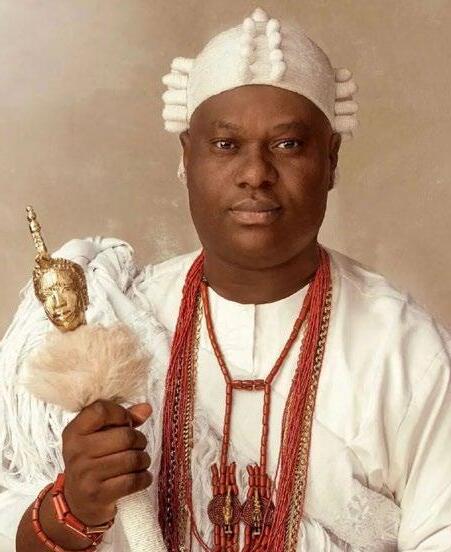

Following the success of her weeklong 60th birthday party, Woodhall Capital and the Nigerian American Chamber of Commerce (NACC) are set to honour Mosunmola Abudu with a visionary leadership award. She is being honoured by the two organisations for significantly influencing the growth of the entertainment and media sectors in Nigeria, promoting cultural exchange between Nigeria and the United States.
nsidered a powerhouse in the African media landscape, Mo as she is fondly called, oversees a diverse media production company including EbonyLife Films, EbonyLife Studios, the EbonyLife Creative Academy, and EbonyLife Place, Nigeria’s first luxury entertainment resort as the Chief Executive Officer of EbonyLife Media.
Under her leadership, EbonyLife Media has produced some of the highest-grossing Nollywood blockbusters and secured production collaborations with international studios like Netflix, Sony, and the BBC. A relentless advocate for African storytelling, Mo amongst her several educational qualifications is an Executive Fellow of Harvard Business School and the Hutchins Center for African and African American Research at Harvard University. Mo’s dedication to the industry extends beyond production. In February 2024, she made history as the guest programmer for the Academy Museum of Motion Pictures in Los Angeles, curating the groundbreaking “Echoes of Africa” series – the first-ever showcase of African cinema at the institution. Her relentless drive and dedication to African storytelling are a true inspiration as her work does not only entertain audiences worldwide, but also create opportunities and propel the African creative industry onto the global stage.
Continued from page 18
OLORI ATUWATSE BAGS US PRESIDENT'S LIFETIME ACHIEVEMENT AWARD
and the office of the President of the United States. The award is one of the highest recognitions given to individuals who have demonstrated an exceptional commitment to volunteerism and improving lives. The award was bestowed on the Olori in recognition of her lifelong dedication to community building and humanitarian service particularly through her Royal Iwere Foundation (RIF) which focuses on education, entrepreneurship, maternal care, and child health, providing scholarships to hundreds of children and empowering women through the Royal Iwere Foundation Skills Institute (RIFSI). In addition to her

charitable work, the Queen Consort of Warri Kingdom has founded start-ups in the fashion and hospitality sectors and has collaborated with government initiatives to improve women’s lives. Her leadership has drawn international acclaim, extending her influence beyond Nigeria.
AGAIN

Wealthy businessman and boss of Dilly Motors, Okwudili Umenyiora, a.k.a Dilly, has found love in the arms of Greek real estate entrepreneur, Anastasia Malandrenia. Anastasia had relocated to Nigeria to expand her businesses. While testing the waters relationship wise, her path and that of Dilly crossed
and ever since then, there has been no looking back. Hopefully they take it to the next level. Dilly was previously married to restauranteur and fashion designer, Fifi for 15 years until the marriage collapsed like a pack of badly arranged cards. Dilly while confirming the crash of his marriage said it crumbled due to irreconcilable differences.
Photo Editor: Peace Udugba [08033050729]
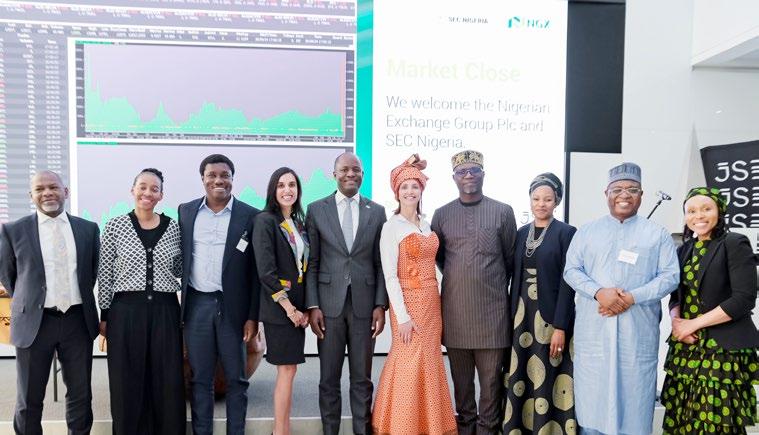
L-R: Executive Commissioner Operations, Securities and Exchange Commission (SEC), Bola Ajomale; Head of Marketing, JSE, Vuyo Lee; Non-Executive Director, NGX Group, Nonso Okpala; Director, Capital Markets, JSE, Valdene Reddy; Group Chief Executive Officer, Nigerian Exchange Group (NGX Group), Temi Popoola; Group Chief Executive Officer, JSE, Leyla Fourie; Director General, SEC, Emomotimi Agama; COO, Johannesburg Stock Exchange (JSE), Itumeleng Monale; Group Chairman, NGX Group, Umaru Kwairanga and Chief Risk Officer, JSE, Qiniso Mthembu, during the Market closing ceremony of the Johannesburg Stock Exchange in honour of the Nigerian Capital Market Delegation's Strategic visit to the JSE in South Africa on October 2, 2024.
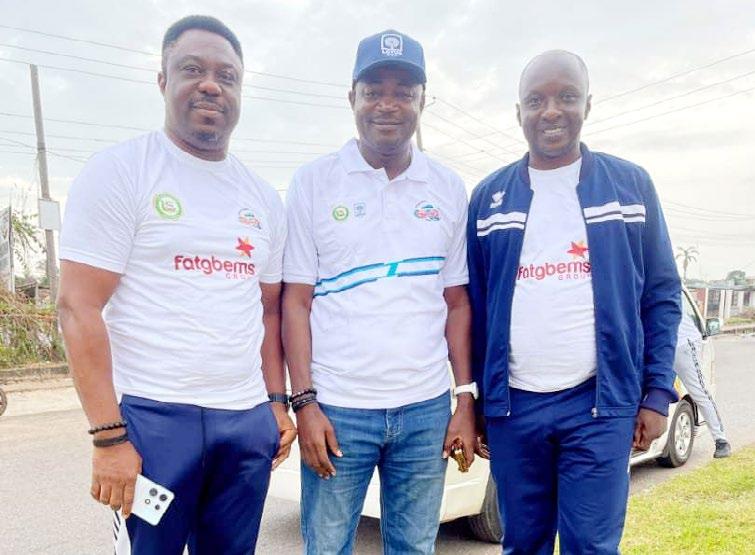
L-R: Chief Operating Officer, Fatgbems Group, Ayodele Odulaja; Commissioner for Youth and Sports, Ogun State, Hon. Wasiu Isiaka and the Senior Brand and Communications Manager, Fatgbems Group, Azeez Adeosun, during the Lotus Bank Abeokuta 10km marathon, organised by Nilayo Sports Management Limited and Sponsored by Fatgbems Group in Ogun State at the weekend.

L-R: Business Editor, Lagos Television, Joshua Murakinyo; Head, Strategy and Research, Nigeria InterBank Settlement Systems plc, William Uko; Chairman, Finance Correspondents Association of Nigeria (FICAN), Chima Titus Nwokoji; Deputy Director, Bank Examination (NDIC), Emma Udechukwu; Group Chief Financial Officer, Parthian Partners, Olayinka Arewa and Divisional Head of Services, Bank of Industry, Isa Omagu, at the Finance Correspondents Association of Nigeria (FICAN) 2024 annual conference, in Lagos recently.
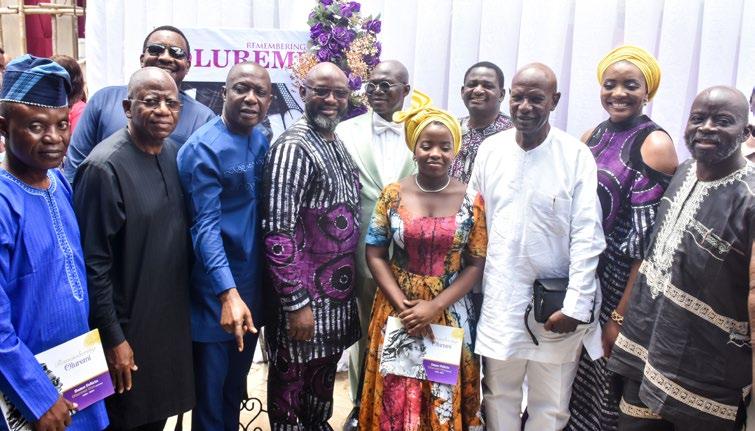
Representative of Managing Director, News Agency of Nigeria (NAN), Mr Adeleye Ajayi (Left); President Nigerian Guild of Editors, Mr Eze Anaba (3rd Left); Son of the deceased, Mr Otome Oyo (4th Left); Former Spokesperson to former President Jonathan, Mr Ruben Abati (5th Left); Granddaughter, Miss Samantha Oyo (Midde); former Spokesperson to former President Buhari, Mr Femi Adesina (4th Right); Husband of the deceased, Mr Vincent Oyo (3rd Right); Daughter, Mrs Okiemiota Abudiore (2nd right) and former Provost of the Nigerian Institute of Journalism, Mr Gbemiga Ogunleye (right), during the 10th years remembrance and Thanksgiving service of Former Managing Director, News Agency of Nigeria (NAN), Dame Oluremi Oyo in Lagos on October 1, 2024.

L-R: Permanent Secretary, Federal Ministry of Education, Dr Nasir Sani-Gwarzo (3rd Left); SecretaryGeneral, Nigeria Union of Teachers (NUT), Comrade Abdullahi Mohammed (3rd Right); President, NUT, Comrade Titus Amba (2nd Left) and other dignitaries, during a news conference to mark the 2024 World Teachers Day in Abuja on October 3, 2024.
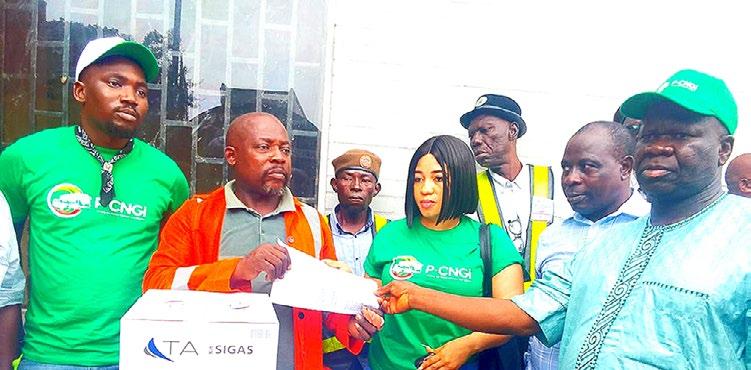
L-R: Project Officer, Presidential Compressed Natural Gas Initiative (P-CNGi), Mr Prosper Akinleye; CNG Conversion Expert, NIPCO, Mr Edosomwan Osabuohien; Business Development Executive (P- CNG), Louisa Afu; Vice Chairman, Oyo State Park Management Service, Alhaji Ademola Adeoye, during the presentation of Presidential Compressed Natural Gas Initiative (P-CNGi) Conversion Centre in Ibadan, Oyo State on recently.





BY JUDE OBAFEMI
Victor Osimhen's journey from Napoli to Galatasaray represents one of football's most compelling narratives of resilience and redemption. The Nigerian striker's exit from the Italian champions was marred by controversy, yet his recent performances in Turkey suggest a player reborn, reminding the football world of the tremendous talent that once lit up Serie A. His story is one of perseverance through adversity, highlighting how even the most celebrated athletes must sometimes take a step back to move forward.
The breakdown of Osimhen's relationship with Napoli began in the aftermath of their historic 2022/2023 season, where his 26 goals propelled the club to their first Scudetto in over three decades. What should have been a period of celebration, with the Nigerian forward emerging as
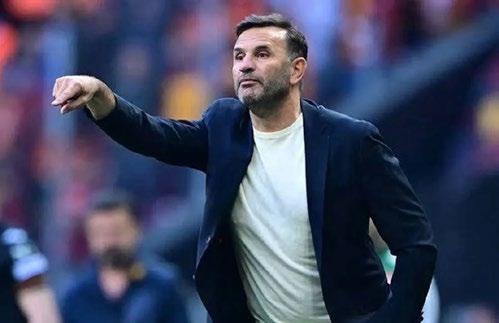
Perhaps most striking is the visible joy with which Osimhen is playing once again
African capocannoniere in the league’s 126 years of existence, instead devolved into controversy when Napoli's official TikTok account posted a video mocking Osimhen's missed penalty against Bologna. This social media misstep ignited a firestorm that would ultimately contribute to the striker's departure, transforming a moment of frustration into a catalyst for change. The incident proved to be the spark for a broader deterioration in relations between player and club. Despite his integral role in Napoli's triumph, Osimhen found himself increasingly marginalised. The arrival of Romelu Lukaku and appointment of Antonio Conte as manager further complicated matters, with the Nigerian international finding himself frozen out of the first team. The subsequent breakdown in trust and failed transfer negotiations with clubs like Al-Ittihad and Chelsea left Osimhen in limbo, until Galatasaray emerged as an unexpected sanctuary, offering him a chance to rebuild his career away from the intense scrutiny of Italian football.
In Turkey, Osimhen has embraced the opportunity for a fresh start with characteristic determination. His recent performance against Kasimpasa, where he netted his first two goals for Galatasaray, served as a powerful reminder of his clinical finishing ability. Though a knock in the same match briefly interrupted his momentum, the striker's impact on his new team has been immediate and significant. The number 45 jersey he now dons symbolises more than just a squad number –it represents a new chapter in his career, one where he appears unburdened by the weight of recent controversies and free to express himself on the pitch.
Perhaps most striking is the visible joy with which Osimhen is playing once again. The striker's trademark enthusiasm, temporarily dimmed during his final months in Naples, has returned in full force. His celebrations with teammates, the intensity of his pressing, and his overall demeanour on the pitch speak of a player who has rediscovered his love for the game. Under the guidance of manager Okan Buruk, Osimhen has found an environment that nurtures rather than constrains his natural abilities, allowing him to exhibit the combination of power, pace, and precision that made him one of Europe's most feared forwards.

The January transfer window looms as a pivotal moment in Osimhen's career trajectory. His loan agreement includes a clause that could see him return to Napoli or potentially secure a move elsewhere. While he remains contracted to the Italian club until 2027, his performances in Turkey have already attracted attention from Europe's elite clubs. For now, Osimhen appears focused solely on


proving his worth on the pitch, letting his football do the talking amid speculation about his future. His approach speaks volumes about his maturity and professional mindset, qualities that have endeared him to teammates and supporters alike.
While Osimhen flourishes in Turkey, Napoli has undergone its own transformation under Antonio Conte's stewardship. After an initial setback against Hellas Verona, the Partenopei have shown remarkable resilience, remaining unbeaten in their subsequent league matches and climbing to the summit of Serie A. Conte's tactical innovation, particularly his implementation of a three-man defence and dynamic wing-back system, has revolutionised the team's approach. The arrival of Romelu Lukaku has proved particularly significant, with the Belgian striker already notching two goals and two assists in the league. His masterclass in the 4-0 victory against Cagliari and in the recent 3-1 triumph against Cesc Fabregas’ Como, where he contributed directly to three goals, exemplify how effectively Napoli have adapted to life after Osimhen, though in a markedly different tactical setup.
Throughout this period of transition at his parent club, Osimhen has maintained his importance to the Nigerian national team. His contributions to the Super Eagles have been unwavering, helping secure crucial victories in their Africa Cup of Nations qualifiers. The support from his international teammates has been particularly meaningful, with many publicly backing him during the Napoli controversy. This solidarity has undoubtedly helped Osimhen maintain his confidence and focus during challenging times, providing a stable platform from which to rebuild his club career.
